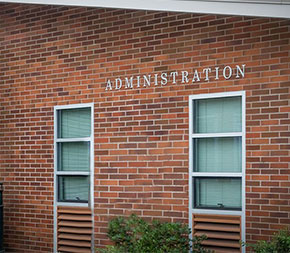Is a School Administrator Career for You?


Great educational leaders are vital to our future, and although seeing students succeed can be its own reward, many of the four million teachers in the U.S. are looking for ways to grow professionally without losing the satisfaction of influencing young minds. A school administration career is one such path. Like teachers, school administrators are essential to the success of their schools and districts, and they never lose sight of the goal: providing the best education to their students.
The Best Educational Administrators Hold These Skills
How do you know if you’re a good fit for a leadership role in the educational environment? All administrators are different, but they generally hold a core set of skills and values that make them successful at guiding students and teachers toward positive results. Here are some of the top traits qualified administrators hold:
| You’re a leader, but you know how to listen | You’re a good “people person” |
| You’re a creative problem solver | You like making systems work better |
| You have a vision, but are willing to discuss | You want to improve education for students AND teachers |
| You know how the school system works | You believe in the power of education |
Where a School Administration Career Path Can Lead
School Principal at Your Own School
With nearly half a million school administrators in the country, job diversity within the field is vast.
For instance, you might start out as a teacher and study for a Master’s in Education online or at night. This education, along with completion of your state teacher certification process, will allow you to move into a position as a school principal in an elementary, middle or secondary school.
As a school principal, you will have a wide variety of responsibilities:
- Providing overall leadership in setting goals and objectives for your school
- Developing and maintaining curriculum standards
- Advising staff
- Hiring, evaluating and improving the skills of your teachers
Moving to the District Level
School principals often move on to become district-wide school administration specialists. These school administrators work with subject-area programs such as English, music, vocational education, special education or math to set curriculum and evaluate teaching techniques.
As a department director, you will work broadly across all the schools in a district to set common standards and provide departmental support.
Instructional Leadership: The Sky is the Limit
From district level positions, you can move into instructional leadership opportunities that include jobs in education law, finance and budgeting, curriculum development and evaluation, research design, data analysis, community relations and politics in education.
These district and state level jobs are often available at colleges, universities, private firms or research entities, and often require more advanced education, such as a doctorate of education in school administration.
Chief academic officers, school deans or provosts work with faculty and school presidents to make faculty appointments, provide instructional leadership, develop budgets and establish academic programs.
Administration Areas of Focus
Education Administration
Education administrators, such as principals, vice-principals and superintendents set educational standards and establish the policies and procedures to carry them out. Most states require principals to be licensed as school administrators.
Education administration degree programs include courses in school management, school law, school finance and budgeting, curriculum development and evaluation, research design and data analysis, community relations and politics in education.
Educational supervision degree programs include courses in supervision of instruction and curriculum, human relations, research, curriculum development and advanced pedagogy courses.
Most school administrators begin their careers in related occupations and prepare for an education administration job by completing a master’s or doctoral degree.
Educational Leadership
Those in educational leadership positions, such as department directors, chairs and deans, are experienced faculty members whose proven tenure and ability have afforded them with leadership positions within their institution.
Some graduate-level work is required of most school leadership positions. Most hold a master’s degree in leadership or their area of specialty, and some-especially those who work at universities-hold doctorates.
Educational leadership master’s degree programs focus on such issues as school effectiveness and improvement, change and restructuring of educational institutions, comparative international study of education reform, and policy analysis and development at the local, state and national level.
Start your school leadership career by proving yourself to be an effective leader in teaching or other administrative positions in your school or district.
Educational Research and Policy
Many educational policy analysts, instructional coordinators, curriculum specialists, researchers and school administrators have master’s or doctoral degrees in educational research and policy.
Instructional coordinators evaluate how well a school’s curriculum meets students’ needs. They research teaching methods and techniques and develop procedures to determine whether program goals are being met. All of these professionals work in a variety of settings and usually enjoy a more professional work environment than their on-campus colleagues.
Degree programs in educational research and policy focus on such issues as school effectiveness and improvement, change and restructuring of educational institutions and comparative international study of education reform. The educational doctorate (EdD) is designed for the professional practitioner and the doctorate of philosophy (PhD) for academic research roles.
As the United States struggles to stay competitive in the world market, educational researchers and policymakers are busy implementing changes that will benefit future generations.
Education Degree Levels for a School Administration Career
Many students starting out in the area of school administration already have a bachelor’s or master’s degree in an area such as teaching, community development or social work, but want to expand their opportunities in education administration, leadership and policy.
If you want to have a positive impact on the direction of public schools, private institutions, or institutes of higher learning, additional training is usually required. Advanced education, such as education specialist and doctoral degrees, are becoming more common for practitioners in these roles.
Most administrators pursue postsecondary degrees such as these:
- Master in Education (MEd)
- Master’s in Curriculum and Instruction
- Education Doctorate (EdD)
- Doctor of Philosophy (PhD)
However, there are also training programs and certificates in specific areas of school administration that can help you gain the qualifications you need to advance.
The Certificate of Advanced Graduate Study (CAGS) is a shorter program (one or two years, depending on the institution) for teachers who want to continue a career in school administration in a chosen field-administration, policy, leadership, etc.-but don’t want to complete a doctoral degree.
Networking Works
One thing to keep in mind when pursuing advanced positions in school administration is that, as in any field, experience and education give you the skills, but networking gets you the job. Professional organizations can be instrumental in helping you hear about positions, meet colleagues and find the right professional fit.
Large organizations, such as the American Association for Adult & Continuing Education (AAACE) or the American Association of Colleges for Teacher Education (AACTE) have events and forums that will help you find more information about your field.
Smaller organizations, such as alumni clubs, or other specific groups such as the American Association of University Women (AAUW), are often active in their communities with meetings and events where you can connect with colleagues and share information.
Education Administration Salaries
There’s plenty of media attention focused on the perceived shortcomings of teaching salaries.
But that same coverage fails to note the comparatively high earnings for those advancing into school leadership positions. If you’re considering an education administration career, the salary and benefits can certainly make it well worth your while.
According to the U.S. Bureau of Labor Statistics (BLS) 2023 Occupational Employment Statistics, here are some salaries for comparable administration careers:
| Career | Median Annual Salary |
|---|---|
| Education Administrators, Kindergarten through Secondary | $103,460 |
| Instructional Coordinators | $74,620 |
| Education Administrators, Postsecondary | $102,610 |
Actual salaries may vary greatly based on specialization within the field, location, years of experience and a variety of other factors, such as work environment.
Benefit Packages
School leadership positions are usually accompanied by generous benefit packages. Most include comprehensive health and pension plans as well as four to six weeks of vacation and performance-based bonuses. In addition, many universities and colleges offer tuition waivers for employees and their families.
For anyone entering one of the many available education administration programs, the timing is excellent. According to the Bureau of Labor Statistics, large numbers of current education administrators are likely to retire within the next decade, leaving a favorable job environment for prospective leaders.
The BLS projects that elementary, middle and high school principals will have a 5 percent job growth through 2032. This is in line with the national average, which is also 5 percent, for all careers. National long-term projections of employment growth may not reflect local and/or short-term economic or job conditions, and do not guarantee actual job growth.



